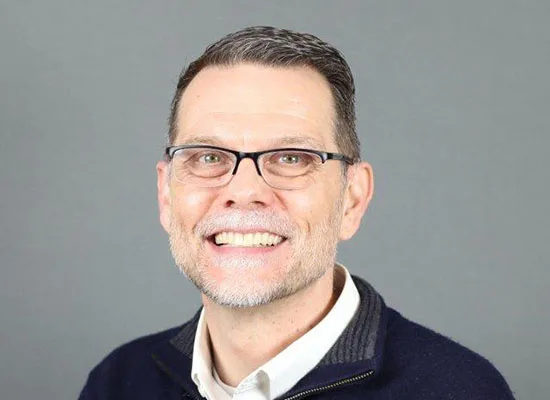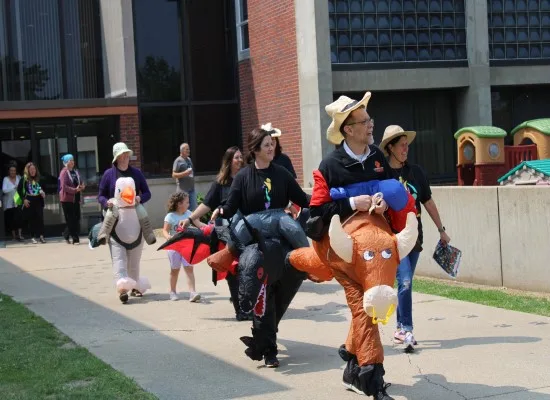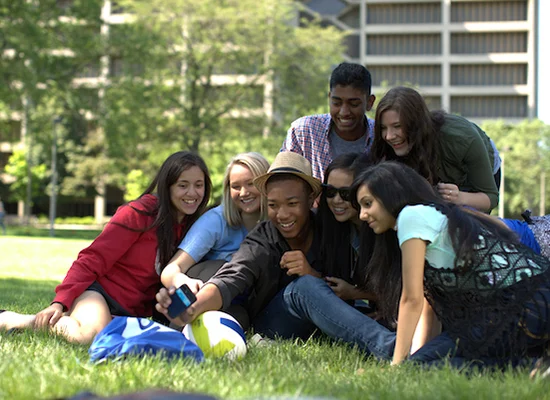Former DSCC Participant Connects Youth with Hearing Loss to Services and Support

Todd Williams received Division of Specialized Care for Children (DSCC) support growing up and now leads the Evaluation Center at the Illinois School for the Deaf
Todd Williams has come full circle.
Todd, 53, grew up with hearing loss that wasn’t diagnosed until late in his childhood. He enrolled with the University of Illinois Chicago’s Division of Specialized Care for Children (DSCC) and a new world of access opened to him.
That access and support led him to a career that’s opening doors and opportunities for countless other Illinois families of children who are deaf or hard of hearing.
Todd is currently the Evaluation Center Director at the Illinois School for the Deaf (ISD). In this role, he helps school children with hearing impairments all over Illinois receive the right assessment, enrichment and intervention services.
Todd also speaks with parents during the annual Institute for Parents of Preschool Children Who Are Deaf or Hard of Hearing on the ISD campus in Jacksonville each June. The Institute is a partnership of DSCC, the Illinois School for the Deaf and other sponsors. It provides valuable education, resources and connections to families of young children with hearing loss in Illinois.
“My involvement with Parent Institute is just to be an advocate and tell them… ‘I’m a client of this program. So, please take advantage of the services that are out there,’” he said.
“The services don’t just come to you. You have to make an effort.”
Todd explains more about how he helps empower and inspire Institute families in the video below:
Todd says he is thankful for the support his family received when they needed it most.
He was in the sixth grade when his language arts teacher noticed something was “off” and mentioned it to his mother.
“Sometimes you don’t know what you don’t know until you do,” Todd said. “Once my hearing was tested, they couldn’t figure out why I was functioning so well! I remember being able to read lips. Even though I might not hear the bell ring, I could see what the other kids were doing and follow along.”
Todd said his hearing loss was mild to moderate at that time, and school wasn’t a struggle.
He was then diagnosed with bilateral sensorineural hearing loss, a condition where there is damage to the tiny hair cells in the inner ear (known as stereocilia) or to the nerve pathways that lead from your inner ear to the brain.
“We don’t know what caused my hearing loss, but I was sick a lot as a young child with allergies and ear infections,” Todd said. “I must have had hearing at some point because I know what letters and other sounds should sound like, so my speech wasn’t greatly impacted.”
He attended public school during the recession of the 1980s, and money was tight for his family as they started researching how to best support his hearing loss.
“The economic situation was terrible, and probably everybody in town was getting or needed some sort of assistance,” Todd explained.
His mom attended a town meeting about available services, and a woman told her about DSCC.
“That was back when DSCC was called the Division of Services for Crippled Children,” Todd said. “Thankfully, the name has changed, inclusion is growing, and the woman impressed on my mom that DSCC could help.”
For 87 years, DSCC has partnered with Illinois families to help connect children with special healthcare needs – including hearing loss – to the services and resources necessary to reach their full potential.

Thanks to DSCC, Todd began to see audiologists and providers who could help. He also received financial support for the cost of his first hearing aid. (DSCC can provide financial assistance for some eligible medical expenses when families meet certain income guidelines.)
“Having my hearing aid was access. We would have found the money somewhere, but it would have been an incredible hardship,” Todd said. “It was no coincidence that things fell in line. With DSCC it was amazing, perfect timing. That’s the beauty of it.”
Later, when his family moved, DSCC went with them.
“No matter where you go in Illinois, DSCC is there,” Todd said. “They were there to help my family with appointments and hearing aids. I got a second hearing aid when I was a sophomore and getting closer to aging out of the program.”
Todd later started planning for college. He took a placement test at John A. Logan Community College in Carterville. While there, a gentleman saw his hearing aids and gave him contact information for the Division of Rehabilitation Services (DRS or DORS) program.
“DORS helps individuals with disabilities become independent, productive citizens. They helped me through school, and I got my master’s at no cost,” Todd said.
He attended Illinois State University and earned a bachelor’s degree in teaching deaf and hard-of-hearing students. He later earned his master’s degree in counseling as well.
Over the years, Todd has worked in education and counseling and served as a deaf/hard of hearing consultant for the state. He also progressed from being hard of hearing to deaf. Todd now has cochlear implants, which unlocked a new world of sounds for him.
He became ISD’s Evaluation Center Director in December 2020. He says he enjoys empowering families and serving as a role model for youth with hearing loss.
“I had a little kid come up to me in the dining hall who was all excited because I had two implants just like him,” Todd said. “So, there’s the role model part, too, which is important for our kids to see that adults do walk around with these (implants), and they are successful.”
Todd encourages families of young children with hearing loss to attend the Institute and learn how ISD, DSCC and other state programs can benefit their children and families.
“Don’t miss out on a chance when you can really gain the most comprehensive evaluation for your child, and the resource list will be phenomenal,” Todd said.
“You have the ability to ask questions, to get questions answered that maybe you’re not feeling comfortable with asking in another setting. That’s what we’re here for. We’re here to answer questions and become a resource for you so the programing for your child can be the best that it can be. That’s our goal.”
Upcoming Education and Scholarship Opportunities for Young Adults with Disabilities

Learn more about the Illinois Community College Initiative and 2023 CSBG Scholarship Program
Finding the right programs and resources is key when planning for the future as a young adult with disabilities.
Two programs currently offer valuable education, training and scholarship opportunities for Illinois youth interested in college or joining the workforce after high school.
Illinois Community College Initiative
The Illinois Department of Human Services’ Division of Rehabilitation Services (DRS) wants to help people with disabilities in their quest for success.
The Illinois Community College Initiative provides academic and vocational training programs for eligible students with disabilities at in-state public community colleges and approved community colleges bordering the state.
People with disabilities who are eligible for the DRS vocational rehabilitation program are eligible to participate. You may complete community college coursework leading to an associate degree or to a degree, certificate or other industry-recognized credential or certificate.
DRS will help you with:
- Tuition
- The cost of fees, books and supplies
- Transportation costs
- Other eligible costs
See the Illinois Community College Initiative flyer for more details.
Spanish-speaking families can listen to the radio ad or read the ad transcript in Spanish.
Ready to get started? Contact your local DRS office using the locator tool or call (877) 581-3690. TTY and relay callers can dial 711.
2023 C.E.F.S. Economic Opportunity Corporation’s CSBG Scholarship
C.E.F.S. Economic Opportunity Corporation has a scholarship program to help students pay for college or occupational training.
The CSBG College Scholarship program provides financial help to income-eligible students living in the following counties:
- Christian
- Clay
- Effingham
- Fayette
- Montgomery
- Moultrie
- Shelby
You can use the scholarship to pay for formal education or occupational training in an accredited Illinois educational institution. Training and degrees may include:
- Associate, bachelor’s or master’s degree, post-secondary education
- General education, short-term training (two years or less) in growth occupation skills
The CSBG scholarship is competitive and awards students based on:
- Income
- The interview process
- Choosing to go into high technology areas or other growth occupations
Previous scholarship recipients can submit an application. You must be enrolled or intend to enroll as full-time students for the fall 2023 semester in an Illinois-accredited college. Full-time is 12 hours or more.
Click on the CSBG Scholarship application or get an application at your county C.E.F.S. outreach office. The application includes contact information for each local office.
You can also visit the C.E.F.S. website for more information.
You must complete your application and submit all requested documents to your local office by April 14 at 4 p.m.
All eligible candidates will have an interview in May.
Find More Transition Resources
Visit the Transition Tools section of our website to find more programs and information to help with planning and paying for college, getting a job and more.
You can browse the Transition: Education Resources and the Transition: Work Resources categories to find what you need.
Our team is also here to help partner with you and your family to help make the transition to adulthood as successful as possible.
Contact us to find out more!


